Behind the News
Behind the News: All the backstories to our major news this week
Published
5 months agoon

Over the past week, there were many important stories from around the African continent, and we served you some of the most topical ones.
Here is a rundown of the backstories to some of the biggest news stories in Africa that we covered during the week:
South Africa: Msimang returns but ANC’s cracks remain
The controversies around South Africa’s ruling party, the African National Congress (ANC), took on a fresh dimension during the week as the party announced that veteran member, Mavuso Msimang, had withdrawn his resignation from the party. Msimang resigned last week, citing “endemic corruption,” and insisted he would continue to speak against any malfeasance impacting the interests of society.
The party is divided and has been in the middle of a leadership crisis and dwindling public support, which could decide whether to keep the current president in power, drastically changing the political landscape in the country as the ANC hopes to retain power in next year’s election.
In a scandal surrounding his handling of substantial amounts of foreign currency pilfered from his prize game farm, President Ramaphosa is being challenged for the leadership of both the party and the nation. The ANC has dominated national politics since the country’s democratic transition in 1994, but in the last three national elections, voter support has been declining. The party has also been losing some of its strongholds since the local elections in 2016.
The so-called “radical economic transformation (RET)” faction, which opposes Ramaphosa almost constantly and seeks to overthrow him, is one factor in the party’s struggle. According to Southall, the faction within the ANC is “destined to remain a powerful bloc,” which will limit Ramaphosa’s ability to lead and advance friction-free governance and the economy.
Recent evidence of the crisis was the announcement on Friday by former president Jacob Zuma, another strong force within the party, where he declared a new party named uMkhonto we Sizwe (MK), meaning spear of the nation, which is the same name as the former armed wing of the ANC.
Next year, Africa’s most industrialised nation will have its seventh election held under the conditions of universal adult suffrage since the end of the apartheid era in 1994. The ANC will contend with Democratic Alliance’s John Steenhuisen, Economic Freedom Fighter’s Julius Malema, and Inkatha Freedom Party’s Velenkosini Hlabisa, amongst other candidates, in the election. Will Nelson Mandela’s party finally lose its grip on South Africa?
Senegal’s Sonko finally wins big in court
After a year of back and forth in a protracted legal battle, Senegalese opposition leader, Ousmane Sonko, was cleared by the court to run in next year’s presidential elections. A tribunal in Ziguinchor, a city in the south, ordered the electoral commission weeks earlier to put Sonko back on the voter list.
His lawyer, Cire Cledor Ly, remarked after a judgement that declared the embattled politician fit to run: “We have confidence in the justice system. This decision doesn’t surprise us. We were just afraid that they might use force against us. But this country won’t go anywhere if justice doesn’t work”.
In his last episode at court four weeks ago, a court of the West African political bloc, ECOWAS, rejected Sonko’s claim that the state had treated him unfairly. The Senegalese government has been in a legal battle with the jailed opposition politician who recently lost a case claiming the state violated his human rights.
Uncertainty around the likely aspiration of President Macky Sall to run for an unprecedented third term has been one of the triggers of violence in the West African country, but the crisis subsided when Sall announced he would not be running in the election.
Over the last two years, Sonko has been involved in many court cases on allegations of rape and libel, both of which he denies. His various legal troubles have triggered violent demonstrations as his followers, who have held protests throughout the year that have sometimes led to deadly clashes with police, accuse President Macky Sall of trying to disqualify Sonko from next year’s presidential election.
Several political parties have declared their intention to seek public office in 2024; however, to move forward with the sponsorship phase, they must first garner enough public support—between 0.8 and 1% of the electorate—to sign on to support a presidential candidate. A minimum of 2,000 sponsorships must be obtained for each of Senegal’s fourteen regions to gather these signatures. Sonko remains a popular candidate who won’t struggle with public sponsorship, but there is another legal hurdle that must be crossed: his Pastef party remains suspended.
Will Niger’s new alliance hold?
Amidst the recent surge in military interregnums in the West African sub-region, regional bloc, the Economic Community of West African States (ECOWAS), has hinted that Niger, which became the fifth country in the region to have a democratically elected president ousted in July, is open to a return to democracy.
Togo’s foreign minister, Robert Dussey, said the military leadership has agreed to return to democratic reign with the agreement, just days after it was announced that a political and economic alliance with West African neighbours, Mali and Burkina Faso, was in consideration.
A common currency factor in the three countries and five others in the region that has a legal tender, the West African CFA franc, is a likely factor in the proposed alliance. “The Alliance of Sahel States… is a defence alliance a priori, but which will evolve towards an economic alliance and much more,” Traore said.
The three continue to team up to withstand pressure for a democratic return, and have dubbed their new union, the Alliance of Sahel States (AES). They would become even more isolated if they were to leave the eight-member West African monetary union and adopt a new currency. They have also endured a series of sanctions from a variety of international bodies, and tension grows as the World Bank recently warned that the latest coup may complicate issues around Nigeria and other West African nations’ food markets.
Currently, there are eight RECs recognised by the African Union (AU), each established under a separate regional treaty. They include the Arab Maghreb Union (AMU), the Common Market for Eastern and Southern Africa (COMESA), the Community of Sahel-Saharan States (CEN-SAD), the East African Community (EAC), the Economic Community of Central African States (ECCAS), the Economic Community of West African States (ECOWAS), the Intergovernmental Authority on Development (IGAD), and the Southern African Development Community (SADC). It is yet to be seen if the AEC will be a welcomed idea by the AU.
Beyond the military factor in the formation of the alliance, it is capable of triggering more economic engagements between them, a consideration that has been clamoured for by observers.
Nigeria: Foreign firms’ exit continues as fears mount over possible FDI shortage crisis
Africa’s largest economy, Nigeria, is still experiencing an exodus of foreign firms operating on its soil. The latest is the Pan-African e-commerce platform, Jumia, which announced plans to end its food delivery business, Jumia Food, in Nigeria and seven other African countries by the end of the year.
The six other countries that would be impacted are Ivory Coast, Kenya, Uganda, Morocco, Tunisia, Algeria, and Algeria, the company said in a statement.
Recently, Nigeria has suffered the exit of high-profile firms amidst rising operating costs. Perennially, Nigeria’s underdeveloped power sector is a bottleneck to broad-based economic development and forces most businesses to generate a significant portion of their electricity. The forex market instability and cost of production hike have massively impacted businesses as well.
Equinor, a major global player in the upstream oil sector, and Procter & Gamble, a major global player in fast-moving consumer goods, or FMCG, are among the recent exits for which a study revealed Nigeria’s economy is expected to lose $335 million (about N310 billion) as a result.
One of the issues around the exit has been difficulty in fund repatriation by the firms as the country had recently restricted access to foreign currency for imports and for investors seeking to repatriate their profits due to a shortage of dollars. Nigeria gets about 90% of its foreign exchange from oil but is struggling to produce due to theft and years of underinvestment.
You may like
-


Behind the News: All the backstories to our major news this week
-


Behind the News: All the backstories to our major news this week
-


US to withdraw military personnel from Niger— Source
-
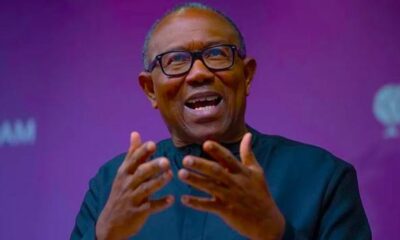

Behind the News: All the backstories to our major news this week
-


Behind the News: All the backstories to our major news this week
-
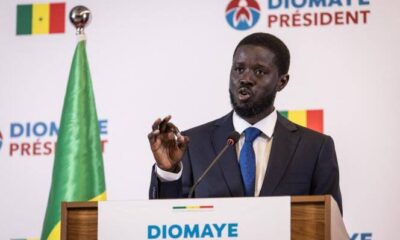

Behind the News: All the backstories to our major news this week
Behind the News
Behind the News: All the backstories to our major news this week
Published
3 days agoon
April 28, 2024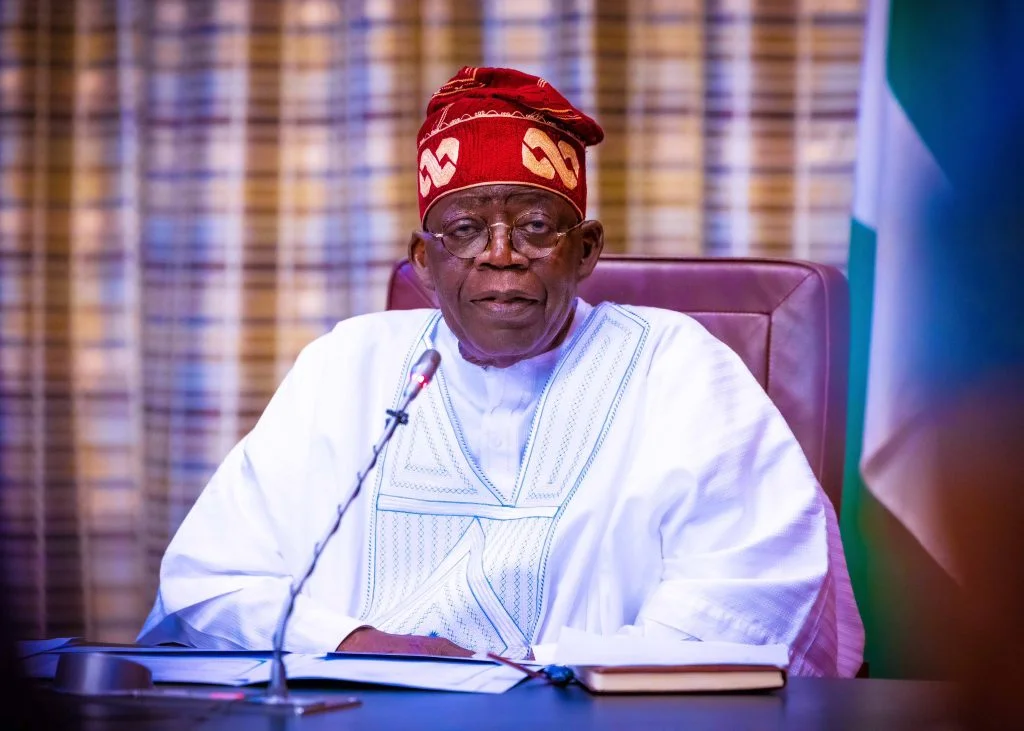
Over the past week, there were lots of important stories from around the African continent, and we served you some of the most topical ones.
Here is a rundown of the backstories to some of the biggest news in Africa that we covered during the week:
1. Renewed Hope: Tinubu’s regular sing-song and the sad reality of Nigeria
During the week in review, Nigeria’s President Bola Tinubu was once again at his rhetorical best when he pronounced the all the tough policy decisions and reforms he has undertaken since coming into office almost a year are have been in the best interest of Nigerians and the good of the country.
Tinubu who spoke during a bilateral business session with Dutch Prime Minister Mark Rutte at the Hague in the Netherlands, said every of his decisions were taken with the interest of his fellow citizens at heart.
He reiterated that his policies which have caused pains and anguish for Nigerians were in their best interest.
“I am a determined leader of my people. I am ever ready to take tough decisions in the best interest of the people, even if with initial pains,” Tinubu said.
“I have and will continue to take the difficult decisions that will benefit our people, even if there is short-term pain,” he added.
But beyond the regular promises of better days ahead by Tinubu and his team, the reality on ground in the country does not seem to align with so much optimism.
The first sign that things were going to be tough was when Tinubu pronounced the end of fuel subsidy in his inaugural address to the nation on May 29, 2023, without as much of a plan to ameliorate the anticipated economic crisis that was to follow.
Despite later attempts to provide some succour and buffers to cushion the effects of the subsidy removal, things have gone from bad to worse with the cost of living rising through the roof.
Inflation has gone up to an all time high of 30.20% according to the Nigeria Bureau of Statistics while prices of basic goods have gone beyond the reach of the average Nigerians, many who find it difficult to provide for their families.
But to President Tinubu, the pains and hardship Nigerians are currently going through will soon be a thing of the past because, according to him, his “tough policies” would yield positive results in the end.
“We have gone through the worst of the storms. I am unafraid of the consequences once I know that my actions are in the best long-term interests of all Nigerians,” he posited.
Nigerians are indeed waiting patiently for the fulfilment of these promises and are looking forward to a time they will go back to living a normal life again!
2. Discriminatory Chinese supermarket meets its match as Nigerian govt shuts mall
A Chinese supermarket located in the heart of Abuja, Nigeria’s capital, ran into hot water when the Federal Competition and Consumer Protection Commission (FCCPC), shut it down following allegations of discrimination against Nigerian shoppers.
Before the action of the government agency, a report had indicted that the supermarket located within the premises of the China General Chamber of Commerce in Abuja, was in the habit of barring Nigerian citizens from shopping in the mall.
Following the exposè which came with video evidence and investigations carried out by the FCCPC turned out to be true, officials of the agency promptly moved in and shut down the mall.
Director for Surveillance and Investigation of FCCPC, Boladale Adeyinka, who led the team, said they took the action was in response to a viral video showing Nigerians being discriminated against and not being able to get into an Abuja supermarket.
“The essence of the surveillance and investigation that we conducted today is to verify the allegations and the content of that viral video,” she told journalists during the exercise.
That was not the first time foreign business ventures have discriminated against Africans in their own country by refusing them their services.
A few years ago, a Chinese restaurant in Lagos was in the news for refusing to serve a Nigerian couple and it took the intervention of the state government for normalcy to return to the outfit after some Nigerian youth decided to vent their anger on the eatery.
Many Chinese, Lebanese and other companies run by foreigners in Nigeria have been found to discriminate against their Nigerian staff and customers but as usual, the powers that be have always turned a blind eye to such allegations, largely because the business owners have their plugs in the right places while the victims are always at the lower rung of the society.
3. Runaway Binance executive reportedly nabbed in Kenya
It was reportedly a bad day in the office for an executive director of global cryptocurrency firm, Binance Holdings Limited, Nadeem Anjarwalla, who had escaped from lawful detention in Nigeria, as he was arrested in Kenya.
Anjarwalla, a British-Kenyan citizen was arrested on arrival in Nigeria on February 26, along with another Binance official, Tigran Gambaryan, on allegations of tax evasion, money laundering and other charges.
But on March 22, Anjarwalla made an audacious escape from a guest house where he and Gambaryan were being held and was promptly declared wanted with the Nigerian authorities engaging the services of Interpol to help track him down.
The manhunt for Anjarwalla was ended when he was arrested in his hideout by a combination of Kenyan police and operatives of the Interpol.
The Kenya Police Service, in a statement confirming the arrest of the fugitive, said the fleeing Binance executive was arrested in “conjunction with the International Criminal Police Organisation (Interpol) and moves were being perfected for his extradition to Nigeria.
But beyond the arrest of Anjarwalla and the embarrassment it caused the country’s security agencies, a lot of questions have arisen from the episode.
Many Nigerians have continued to wonder how he managed to escape from the so-called safe house he and his colleague were being held.
How could Anjarwalla stage such an escape without the active connivance of some security officials who must have had their palms greased?
How did he manage to get a replacement passport to leave the country since his original passport had been seized by the Economic and Financial Crimes Commission upon his arrest?
Questions, and more questions have continued to rise and Nigerians are waiting for answers, if they will come at all.
4. Zambian CSO blames media polarisation for biased reportage
The Executive Director of a Zambian civil society organisation, Chama Mwansa, has blamed the polarisation of the media for biased coverage and reportage in the country.
Mwansa who is the ED of the Chandarika Women and Youths Foundation, in an interview with Zambia Monitor, said the media was balkanized between private and state-owned media outlets which has led to a bias in news coverage.
“The media plays a crucial role in society. Media freedom allows for comprehensive coverage of various perspectives, whether from the opposition or the ruling party,” she said in the interview.
She also harped on the importance of media freedom, freedom of speech, and digital rights in promoting social and economic development, and emphasized on the importance of media partnerships in facilitating coverage of events.
Mwansa’s observations on the polarisation of the media industry in her country can also be replicated in many African countries where the media is gagged and practitioners are made to look like the dregs of the society.
In many African countries, journalists are seen as dangerous species with many of them treated with disdain. Many journalists in different parts of the continent have been abducted, brutalized and killed for just doing their jobs which have constantly raised the question on the safety and freedom of journalists.
5. Al Ahly, Esperance in clash of titans for CAF Champions League trophy
For the fourth straight seasons, two of Africa’s most successful clubsides, Al Ahly of Egypt and Esperance of Tunisia, will clash in the final of the TotalEnergies CAF Champions League scheduled for next month.
Al Ahly which is the current holders of the title and their long-standing rivals Esperance, booked their places in the final in dramatic fashions to earn their places in the final of Africa’s epic football tournament.
Al Ahly cruised past former champions TP Mazembe of the DRC 3-0 in their two-legged semi final tie, while Esperance defeated another former winner, Mamelodi Sundowns of South Africa, running out with a 2-0 aggregate victory.
Al Ahly, winners of the five of the last seven editions of the CAF Champions League, will be aiming for her 12 trophy when they visit Esperance for the first leg in Rades on May 18, while the Tunisian giants will be gunning for a fifth Champions League title, which clearly puts the two teams as the best in the continent.
The second leg will hold in Cairo a week later, which, on paper, gives Ahly a sense of home advantage.
- But however it turns out, there will surely be fireworks as the two teams battle for the glory in the two-legged final and surely, whichever team comes out tops will be the best for the African continent.
Behind the News
Behind the News: All the backstories to our major news this week
Published
1 week agoon
April 22, 2024
Over the past week, there were many important stories from around the African continent, and we served you some of the most topical ones. Here is a rundown of the backstories to some of the biggest news stories in Africa that we covered during the week:
Nigeria’s big feat against meningitis
Nigeria made a significant step in its fight against the World Health Organization (WHO) announced on Monday that Nigeria is the first country in the world to give out Men5CV, a “revolutionary” new vaccine. People are getting sick more in Nigeria than anywhere else in Africa. They say that the number of cases each year went up by 50% in 26 African countries that are known to have a high risk of meningitis.
Nigeria is the first country in the world to have given this vaccine which protects against five strains of the meningococcus bacteria. The Vaccine Alliance (Gavi) pays for the vaccine and emergency vaccination operations.
In Nigeria, between October 1, 2023, and March 11, 2024, there was an outbreak of Neisseria meningitidis (meningococcus) serogroup C that caused 1742 suspected cases of meningitis, 101 confirmed cases, and 153 deaths in seven of the country’s 36 states. These states were Adamawa, Bauchi, Gombe, Jigawa, Katsina, Yobe, and Zamfara.
Gavi also pays for the global meningitis vaccine stockpile and helps low-income countries get regular meningitis shots. Nigeria is one of 26 countries in Africa where meningitis is very common. It is in an area called the African Meningitis Belt. The number of meningitis cases reported each year in Africa rose by 50% last year.
Being a serious infection, meningitis makes the membranes (meninges) that cover the neurons in the brain and spinal cord swell up. Viral, bacterial, fungal, and parasite pathogens are some of the things that can cause meningitis. Headaches, fevers, and stiff neck are common signs. Bacterial meningitis is the worst kind. It can also lead to septicemia, which is blood poisoning, and people who get it can become severely disabled or die within 24 hours.
Besides Nigeria’s meningitis vaccine campaign, the international summit on meningitis in Paris will be a big step toward ending the disease as leaders will meet to celebrate progress, discuss problems, and decide what to do next.
Britain /Rwanda migration deal remains stuck
Rishi Sunak’s plans to send asylum seekers to Rwanda took another defeat this week when they were turned down again by the upper house of parliament in Britain. The parliament came up with changes that would slow down the policy but not stop it. The leader of the country thinks this will help his party win the next election.
Last year, the British government said it was going to send thousands of refugees back to the East African country. This was done to stop people from trying to get protection by crossing the English Channel in small boats from France. Part of an agreement worth £148 million is the idea.
Despite a Supreme Court’s ruling against the controversial move, Sunak has pushed to enact the law through parliament, praying that British courts should consider Rwanda a safe place to visit and that people should only be able to appeal in very rare situations. Europeans have become worried about people coming in illegally from the Middle East and Africa these days. As of June 2023, a record 45,000 people had flown in small boats across the English Channel.
Since Monday, when the House of Commons turned down the House of Lords’ second set of plans to change the new laws, they tried again. The House of Lords is Britain’s appointed upper house. But it’s not likely that the move will stop the bill from being passed this week. If it does, it will become law.
Ahead of the elections later this year, Sunak has put a lot of political capital into the Rwanda plan. He says it will help him keep his word to stop small boats carrying thousands of people who are trying to get into Britain illegally.
About 14.4% of the UK’s population, or 9.5 million people, were born outside of the UK in 2021. A record 45,000 people, mostly from France, crossed the English Channel in small boats last year. More than 11,000 people have been here so far this year. Getting rid of illegal immigration is one of Prime Minister Rishi Sunak’s top objectives.
Burkina Faso takes further steps from France
West African country, Burkina Faso has continued its diplomatic stance against former colonialist, France as it expelled three French diplomats allegedly being involved in actions against the government. The West African country, under military rule like five others in the subregion in a letter sent April 16 to the French embassy said that the three diplomats, two of whom were named as political advisers, were told they were not welcome in the country and had 48 hours to leave.
Sources quoted by Reuters said the officials were kicked out because they met with people from the public. There have been five coups in the area in the last three years. Most of them were linked to ties with France. The latest coup in Niger could make things harder for food markets in Nigeria and other West African countries, the World Bank said not long ago.
Around the world, rights groups, and other interest bodies claim that the junta restricts the freedom of speech and is scaring off critics while it tries to deal with a security crisis caused by rebels with ties to Iran and Al-Qaeda.
Last year, the government announced that it had suspended the 2018 military accord with France, though it still wanted support in the form of equipment. France deploys about 400 special forces soldiers in Burkina Faso, which the military government rules, but relations have deteriorated and tensions have soared in recent months.
Burkina Faso is one of the poorest in the world, and over the past ten years, a war that started in Mali and spread across the Sahel has killed thousands of people. People in the country are more against France now than they were a few months ago because they think that France’s armed presence has not made things safer, expelling its diplomatic might just be another low in their relations as the wave against the former European colonialists continues across the subregion.
Nigeria: ‘World beater’ Onakoya sets new chess record
Nigerian chess prodigy, Tunda Onakoya began an attempt at a 58 hours play of the game to surpass the world record of 56 hours, nine minutes, and 37 seconds, which was set by the Norwegian duo of Hallvard Haug Flatebø and Sjur Ferkingstad in 2018. Onakoya has broken the record set in 2018 by 56 hours. He also wants to raise $1 million for his charity, “Gift of Chess and Chess in Slums Africa,” which he has used to help vulnerable children in Africa.
For 60 hours straight, Onakoya played in Times Square in New York City to raise money for the schooling of poor children in Africa as he played from Wednesday morning until early Saturday morning, having been inspired by the huge number of people who wanted to see him succeed.
Within Nigeria, Onakoya is well known for starting the Chess in Slums project in 2018 in Ikorodu, which is on the outskirts of Lagos. Often outcast young people, many of whom don’t go to school and work to support their families, can learn to play chess at the organization with the country having one of the highest rates of child absence from school in the world, with more than 10 million kids of school age not going to school.
The Guinness Book of World Records has not yet confirmed the new record. This process can take up to two weeks. Whatever the case, Onakoya’s accomplishment has already had a big effect, showing that even from “corners of disadvantage,” big changes are possible.
EDITOR’S PICK


Tanzania’s horticultural industry gets $2.1m grant from TradeMark Africa to boost market expansion
The Tanzanian horticultural industry has recieved a grant of $2.1 million from TradeMark Africa to enable it boost its market...
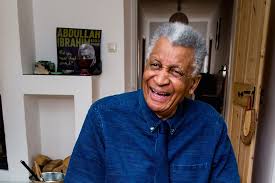

South African Jazz great Abdullah Ibrahim to embark on world tour at age 90
Renowned South African jazz master and pianist, Abdullah Ibrahim, is set to embark on an unprecedented world tour to celebrate...


Kenya unveils ‘killer-squad’ for Paris Olympics marathon Ahead of the 2024 Paris Olympic
Ahead of the 2024 Paris Olympic Games kicking off in July, Kenya has unveiled a “killer-squad” for the marathon event....
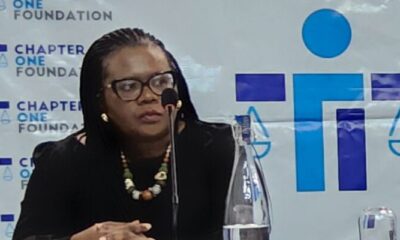

Civil society group says planned online regulation under IBA Act, an affront on media freedom (Video)
Chapter One Foundation Executive Director, Linda Kasonde, says the planned online regulation under the new Independent Broadcasting Authority (IBA) Act...
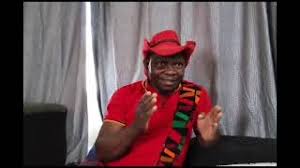

Clergyman raises concern over abuses associated with digital rights and freedom of expression
Emmanuel Kalulu, a clergy member from the Brethren Christ Church in Choma, has expressed concerns about the misuse of media...


Nigeria’s Dangote refinery set to get valid operating licence
The Nigerian government has revealed that the 650,000 barrels per day Dangote Petroleum Refinery will soon receive a full operating...
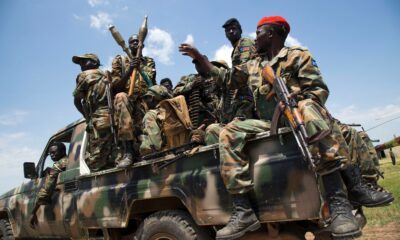

US wants UAE, others to cease support for Sudan’s warring parties
The United States wants all countries, including the United Arab Emirates, to stop helping the warring sides in Sudan, the...
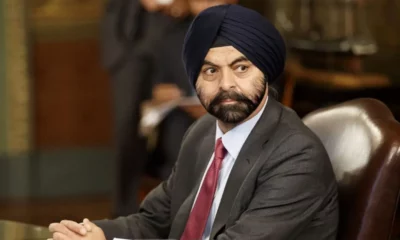

W’Bank chief Banga expects rich nations to meet Africa’s donation expectations
Ajay Banga, President of the World Bank, has said that he thinks donor countries will follow through on African leaders’...


Kenya: President Ruto assured of fresh IMF disbursement
This would help the economy, which is getting better after avoiding a debt problem earlier this year. Since the government...


In 30 years, half of Nigerian biscuit companies went out of business— Manufacturers
The Manufacturers Association of Nigeria has claimed that in the last 30 years, half of the companies in the biscuit...
Trending
-
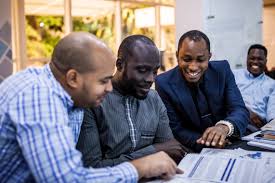
 Tech2 days ago
Tech2 days agoVillage Capital partners Norad to launch climate-focused programme in Africa
-
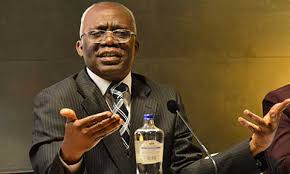
 Metro2 days ago
Metro2 days agoNigeria: Human rights lawyer accuses govt of acting World Bank, IMF script on electricity tariffs hike
-

 Culture2 days ago
Culture2 days agoWizkid, Davido’s online battle gets nasty as they exchange ‘dirty’ tweets
-
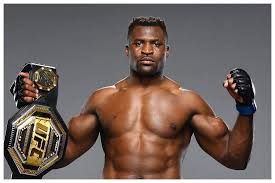
 Sports2 days ago
Sports2 days agoCameroon’s boxing icon Francis Ngannou loses 15-month-old son


